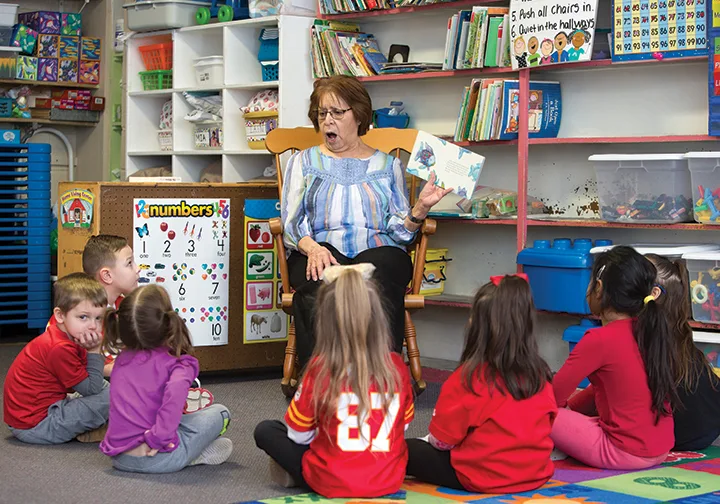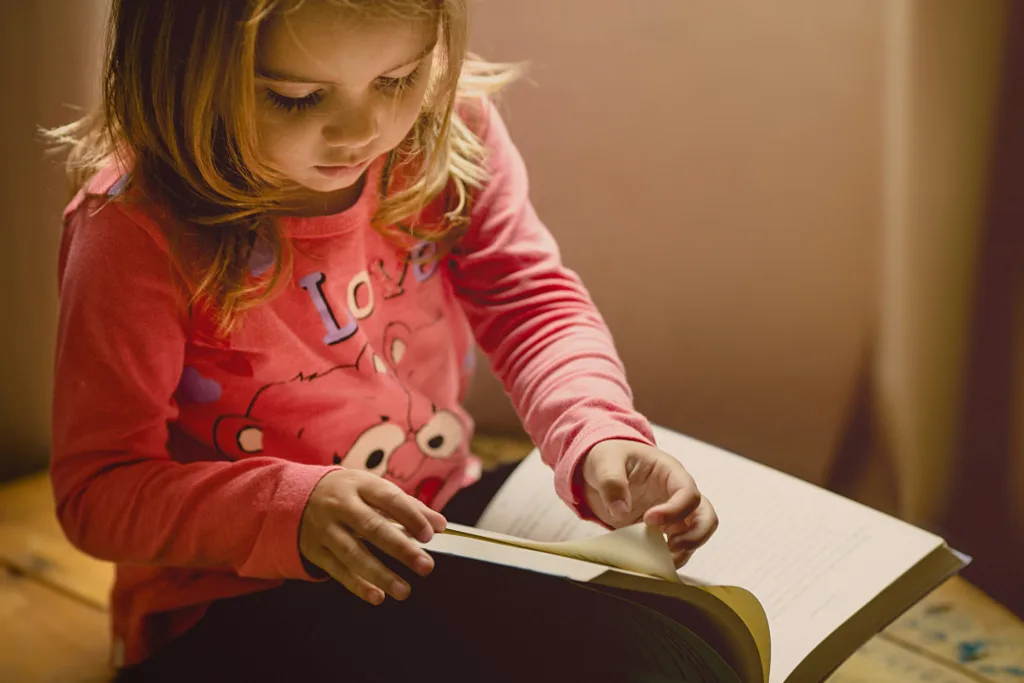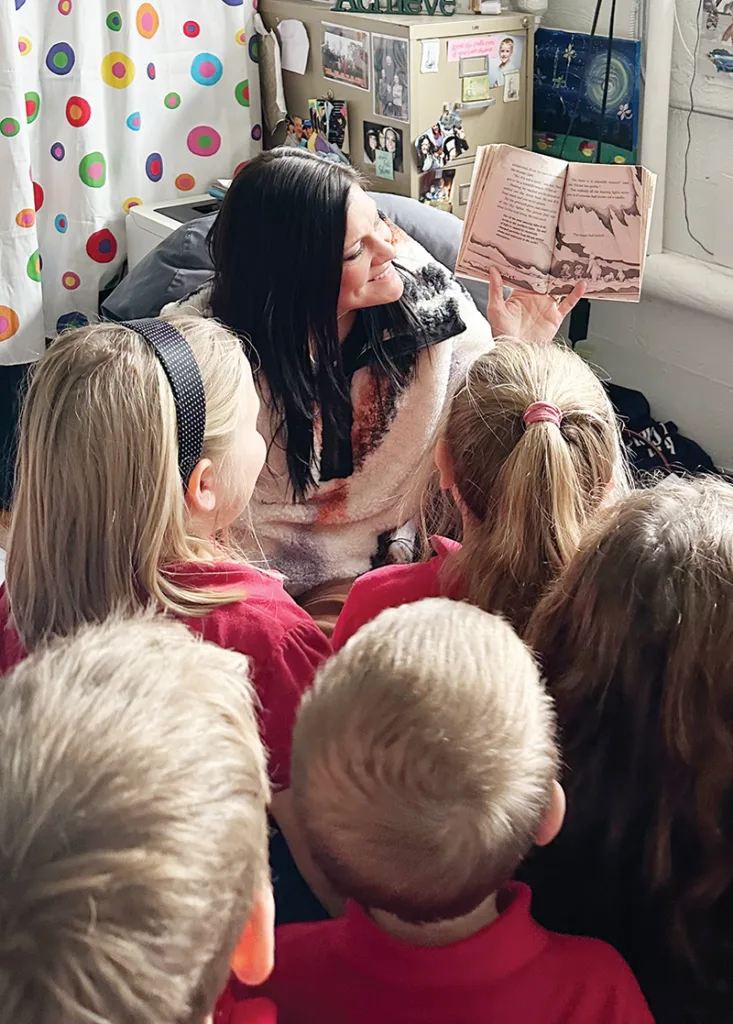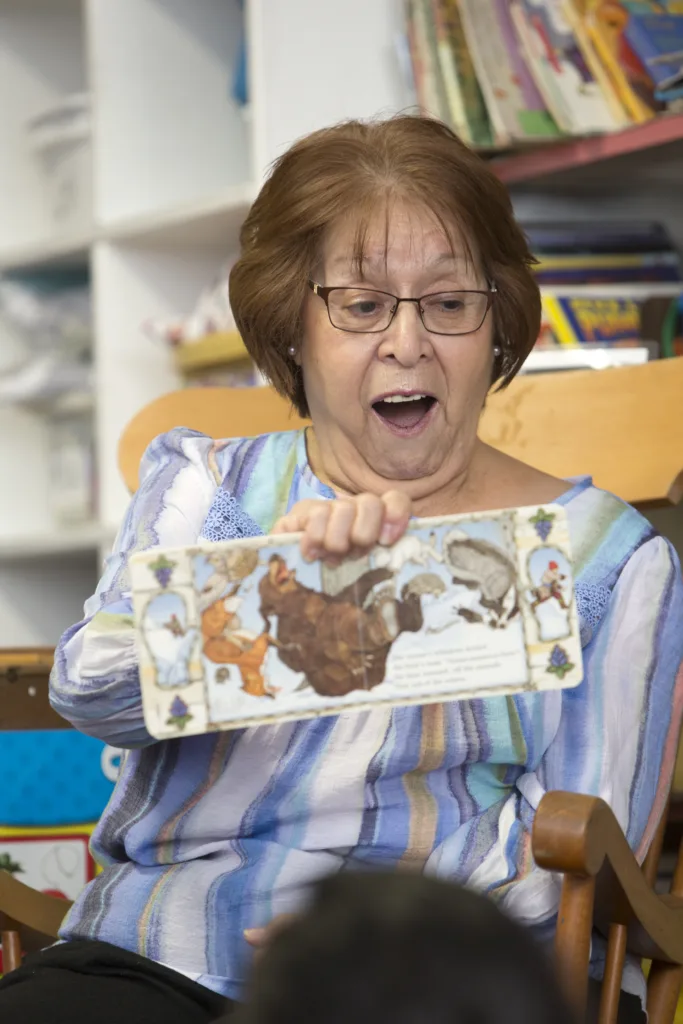
by Catherine Halbmaier
Special to The Leaven
KANSAS CITY, Kan. — Almost from birth, a child’s mind is teeming with imagination and curiosity.
According to teachers and librarians of archdiocesan schools, reading is vital to fostering those attributes.
The development of vocabulary, comprehension and problem-solving skills gained through reading in early childhood is also an essential foundation to the learning that will follow.
And according to those same archdiocesan educators, an emphasis on reading is more important than ever in today’s technology-heavy society.
Bringing stories to life
Liz Gonzales, a kindergarten teacher of 11 years at Resurrection School in Kansas City, Kansas, has witnessed firsthand the importance of developing strong reading habits, that often start with reading aloud to them.
“For a lot of my students, it’s getting to hear that vocabulary, hearing words that they might not have heard before,” said Gonzales, that leads to reading progress.

Gonzales emphasizes putting sounds together to help her students recognize words. She has special tips for bilingual families and believes reading to a child in any language can be beneficial.
“I always encourage the families, just because I read to them in English doesn’t mean you have to,” said Gonzales.
“Read to them a story in whatever language you speak,” she continued, “because whatever language you read to them is building their vocabulary.”
Despite her passion for the job, teaching was not always in the plan for Gonzales.
“I didn’t originally intend to be a teacher,” she said. “I was going to be a vet. But in college, I took an education class and ended up falling in love with it. I knew it was where I was supposed to be.”
Now, Gonzales enjoys helping her students bring stories to life in the classroom.
“They hear a lot of stories throughout the day,” she said. “We use Vooks, a storybook online program that brings the story to life, so they get to see these characters and words that I’m seeing are a story.”
‘Books take us places’
While technology helps educators like Gonzales teach reading in the classroom, some worry that it takes away interest in reading.
Debbie Otting, librarian of 20 years at St. Matthew School in Topeka, has seen the effect of technology on young readers over time.
“When I started 20 years ago, kids were just more up to loving a novel,” said Otting. “In the last eight or 10 years, there has been a shift, particularly in the middle school kids.”

Otting has noticed a decrease in enthusiasm from students, and also a change in the school systems.
“Some schools are shifting from books on shelves to e-books,” said Otting. “Books take us places when we have to stay where we are, but now cellphones take us places, too.”
But Otting doesn’t think the change is good.
“I don’t think there is any replacement for having a book in your hand,” she said.
To keep reading a part of children’s lives, Otting recommends having a daily time to unplug.
“It’s helpful to have a break from a lighted screen,” Otting said. “I hope we don’t ever completely get away from libraries for kids to search out books and hold them and take them home.
“It’s something you will do throughout your entire life. You won’t do algebra your entire life, but you will read.”
Unlimited benefits
Reading is an important skill that can set children up for success in countless other ways.
“A huge part of reading aloud is what it does cognitively to kids,” said Mariah Dalsing, a kindergarten teacher at St. Rose School in Garnett. “It helps with learning how to solve problems, and [it increases] their comprehension skills.
“If you have a child who, in a year’s time, is hardly read to, they will be exposed to 1,000 words a year. Other children can be exposed to 77,000 new words in a year if their parents read to them every day.”

Dalsing heavily encourages parents’ involvement in their children’s early reading, whether it be reading to them, or listening to their children read to them.
“I have watched two kids come into my classroom — one above average in reading and one below average,” Dalsing said. “The above-average kid would never read to their parents, but the below-average child read every night.
“This [second] kid skyrocketed because of the skills that they were using every day — and it’s 10 minutes.”
Along with reading together at home, Dalsing recommends that parents take their children to their local public library. This free resource allows kids to explore a wide variety of literature and explore their unique interests.
Not only does reading with parents develop a child’s skills, but it can be a meaningful bonding time for families.
“Kids know when their parents take the time out that is meaningful to spend time with them,” said Dalsing. “You have the opportunity to make connections with your kid, you get to learn about their personality and what they like.”
Skills for life
Reading together can be an excellent way for parents to bond with their children and encourage good learning habits.
Angelina Thomas, a veteran prekindergarten teacher for Holy Name of Jesus School in Kansas City, Kansas, encourages parents to read with their kids.
“I have always been a firm believer that you can start reading to a baby in the arms,” said Thomas.

In her classroom, Thomas reads up to three books to her students throughout the day. According to her, reading and being read to help the students develop creativity, memory and can even help them cope with difficult emotions.
“I have a book that I read one year because a little boy’s grandpa died,” said Thomas. “It’s about coping with death for little children, and at the end, this little boy decided to put his grandpa’s picture on his nightstand to help remember him.
“Last year, I had a little boy whose dad died, and I read him that book. This year, his mom came and hugged me; she said it had really helped him to cope with the loss.”
Reading and being read to develop many vital skills in children. With vocabulary, memory, creativity and even emotional difficulties, kids have a lot to gain from early exposure to the written word.
It is no wonder that teachers highly encourage parents to read with their children.
So, as Thomas said, “Start reading to your child as early as possible — as soon as you bring them home.
“They’ll hear your voice, bond and someday develop a love of reading.”
Imagination Library now includes Kansas
It’s been Taylor Swift making all the headlines here of late. But it might be another music icon — Dolly Parton — who will have the greatest impact in the long run on the future of Kansas.
Last August, the legendary singer/songwriter came to the state to announce the expansion of her Imagination Library to the children of Kansas.
Parton, who was inspired by her own father’s inability to read, has long been an advocate of early reading programs — and she’s put her money and her fame where her heart is.
Starting out with 1,700 books in 1995 as a program for children in her own county in Tennessee, Parton’s Imagination Library now delivers over 2 million free books monthly to children in five countries.
To enroll any Kansas child from birth to his/her 5th birthday to receive free, age-appropriate books mailed directly to their home every month, fill out an easy form online at: https://kschildrenscabinet.org/imaginationlibrary/.
Grandparents, aunts, uncles, caregivers, etc., can even register the child and have the books sent to their address rather than the child’s. To view in advance the list of books your child will be sent, go online to: https://imaginationlibrary.com/usa/book-list.
The next step is even easier. Watch with your child for his or her free books to start arriving, and when they do, read, read, read!






